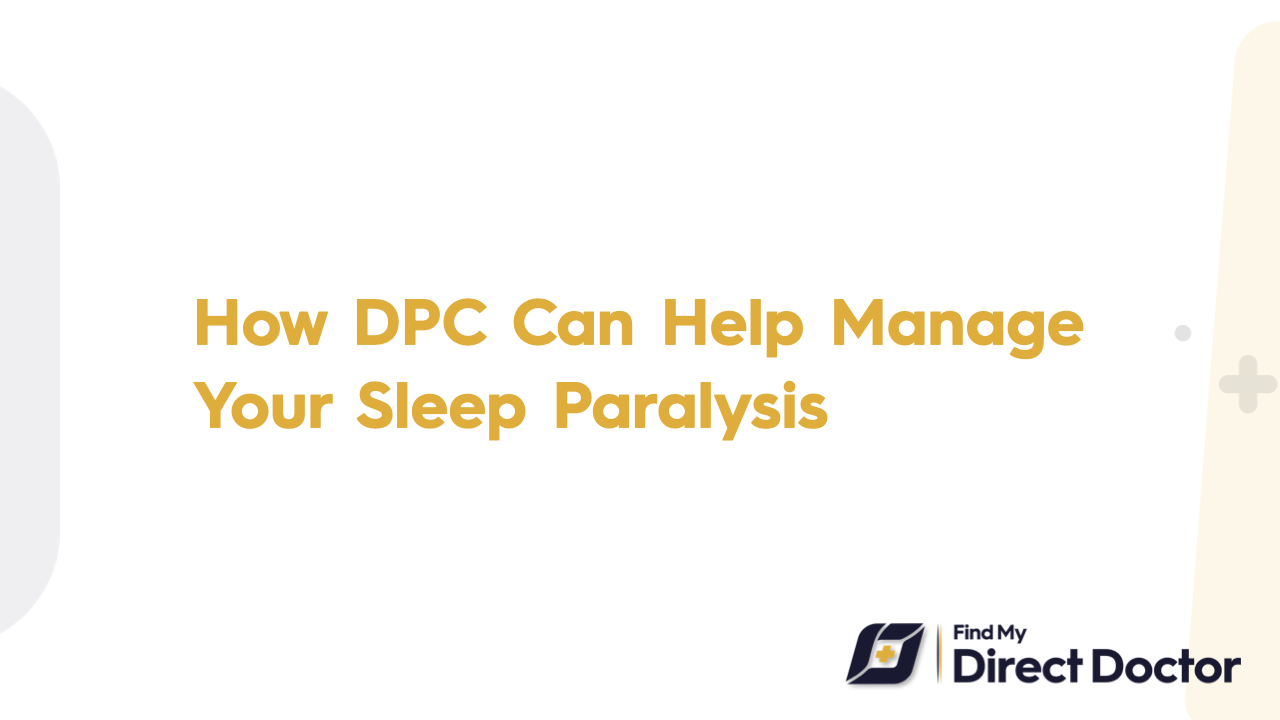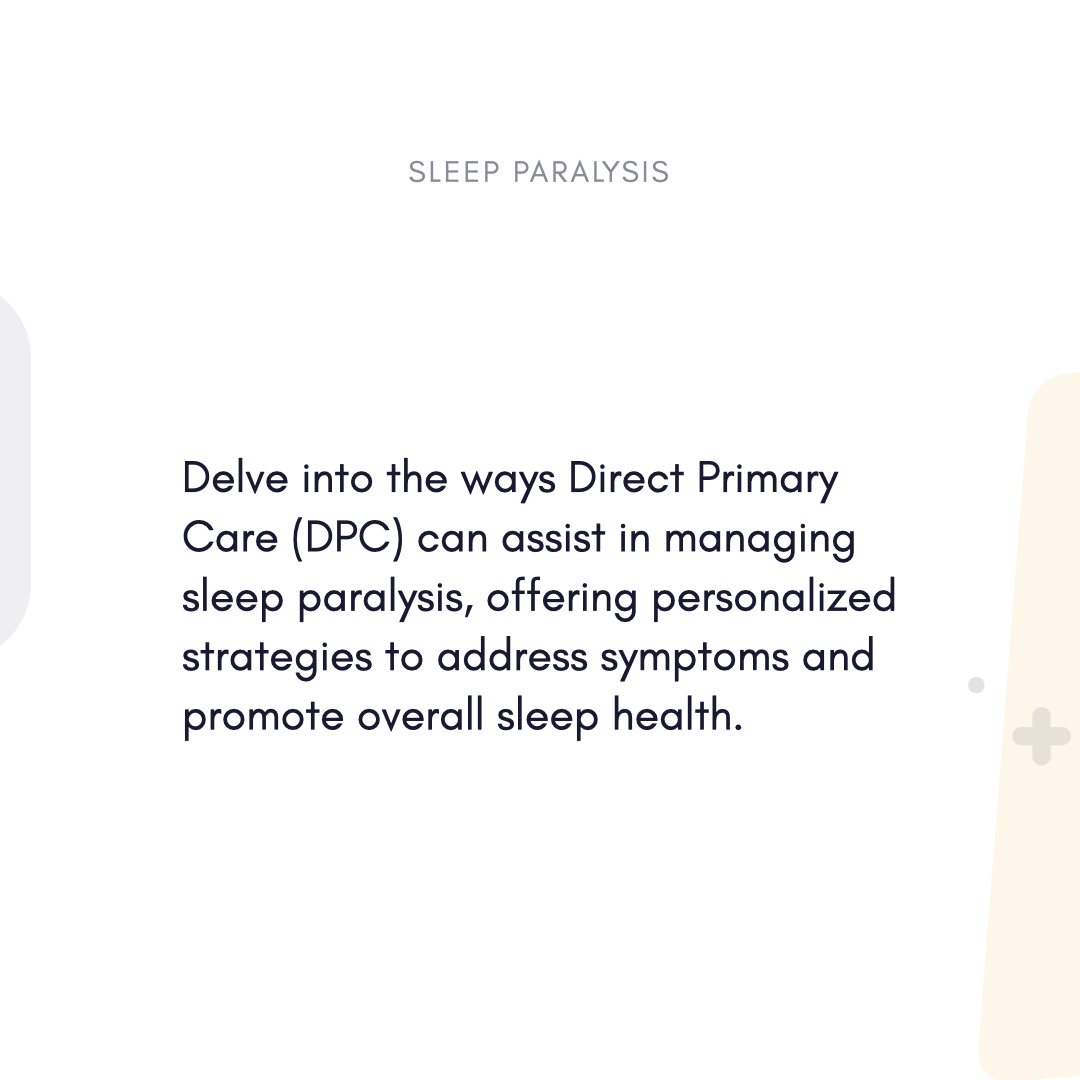Sleep Paralysis and Direct Primary Care (DPC): Breaking Free with Personalized Care
You understand the great misery of sleep paralysis if you have ever woke up unable to move, talk, or breathe—trapped in a terrible limbo between sleep and consciousness. Affected 8% of adults at least once in their lifetime, this disorder usually results from stress, irregular sleep, or diseases like narcolepsy. Ignored left unmanaged, recurrent episodes can aggravate anxiety, sleep avoidance, and chronic fatigue. There is hope, though: Direct Primary Care (DPC) combines fast intervention, customized plans, and relentless support to provide a compassionate, scientifically based method of treating sleep paralysis.

Appreciating Sleep Paralysis and Its Effects
When the brain moves incorrectly between sleep phases, a condition known as sleep paralysis results in temporary muscular atonia—paralysis—while conscious. Typical triggers range from:
- Inadequate sleep or inconsistent schedules
- Trauma, stress, or anxiety
- Underlying disorders (such as sleep apnea, narcolepsy)
Main symptoms: Hallmark ones
- Inability to walk or talk for seconds to minutes
- Hallucinations (such as pressure on the chest or darkly formed figures)
- During episodes, strong panic or fear
Long-term dangers of unmanaged sleep paralysis:
- Either constant sleeplessness or fear of sleeping
- Daytime tiredness affecting relationships or job
- Decline in mental health (anxiety, depression)
DPC Turns Sleep Paralysis Treatment Around
Under the membership model known as Direct Primary Care (DPC), patients pay a monthly fee—usually 50 USD–150 USD—for unlimited access to their main care physician. For those with sleep paralysis, this means no surprise bills, no waiting months for a sleep specialist, and treatment emphasizing your emotional and physical well-being.
Here's why DPC distinguishes itself:
1. Effective, Evidence-Based Intervention Timely
Following American Academy of Sleep Medicine guidelines, DPC doctors do:
- Comprehensive assessments: Using low-cost lab panels or at-home sleep tests, rule out sleep apnea or narcolepsy.
- Examining sleep logs, stress levels, and lifestyle choices—e.g., shift work, screen time—helps one to identify triggers.
- Quick triage: Using same-day telehealth visits to address post-episode acute anxiety.
2. Customised Management Strategies
DPC doctors create strategies for sleep hygiene optimization over 30 to 60 minutes per visit.
- Fixed wake-up times, pre-bed rituals (e.g., reading instead of screens), and caffeine curfews help DPC doctors create strategies for sleep hygiene optimization over 30 to 60 minutes per visit.
- Techniques for reducing stress: progressive muscular relaxation, mindfulness meditation, cognitive behavioral therapy for insomnia (CBT-I).
- Targeted treatments include low-dose SSRIs for regular anxiety or melatonin to reset circadian rhythm.
3. Reasonably priced ongoing support
- DPC clinics offer generic drugs like trazodone at wholesale rates, so lowering stress and expenses.
- Not doing expensive sleep lab tests unless absolutely required.
- Giving 24/7 access to manage panic, change treatments, or talk about episodes.
DPC's advantages for those suffering with sleep paralysis
Proactive prevention
- Teaching patients about REM cycles will help them to demystify episodes of sleep.
- For students or shift workers, lifestyle changes include a gradual sleep schedule.
- Techniques called "Wiggle a toe" help break paralysis more quickly.
Integrated Mental Health Treatment
DPC combined:
- Managing anxiety: Referrals to in-network EMDR or exposure therapists.
- Support groups: Linking patients with others going through like experiences.
- Yoga nidra, sometimes known as guided imagery, helps ease bedtime anxiety.
Cost Reduction
- No co-pays for quick post-episode visits.
- Sleep studies in traditional settings cost 3,000 USD+; at 200 USD–500 USD they are less.
- Using proactive treatment helps one avoid ER visits for panic attacks.
Success Stories from Real Life
- Case 1: Ana, 27, experienced weekly paralysis episodes during test preparation. Her DPC doctor diagnosed chronic sleep deprivation, advised a rigorous 8-hour sleep schedule, and taught "finger flicking" to break free from paralysis—reducing episodes by 80% in 4 weeks.
- Case 2: David, forty, shied away from SSRIs out of guilt. His DPC clinic recommended low-cost trazodone and teamed with a CBT-I coach to help him stop having episodes in three months.
Ask questions about DPC and sleep paralysis.
- Q: Can one cure sleep paralysis?
- A: A lot of people find near-complete remission with stress management and lifestyle changes. DPC looks for root causes rather than only symptom control.
- Q: For students or uninsured patients, is DPC reasonably priced?
- A: True. By skipping sleep specialist co-pays and inflated medication costs, members save 40–60% on average.
- Q: Should I be seeing a neurologist?
- A: A DPC physician often negotiates self-pay discounts for consultations and coordinates referrals.
Why DPC Benefits Those Affected by Sleep Paralysis
As foundations of treatment, patient education and continuity are stressed by the American Academy of Sleep Medicine. DPC delivers this via:
- Demystifying episodes: Lowering anxiety with scientifically based justifications.
- Establishing trust: A regular doctor-patient contact helps to reduce shame.
- Tools to help one get back under control both during and between episodes.
Get Back Your Nights with DPC.
Sleep paralysis need not rob your peace. DPC helps you to break free—night after peaceful night—by means of a partner who listens, teaches, and prepares you.






